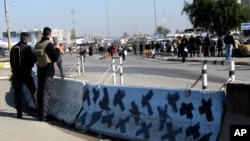CAIRO —
Iraqi police say three bomb explosions killed at least 13 people and wounded several dozen more Sunday in Baghdad. The most serious blast was at a bus and taxi depot that hit a group of Iraqi Army recruits.
Fire crews doused blazing vehicles after the latest bombings in the Iraqi capital, during a wave of violence aimed mostly at pro-government and Shi'ite targets. The most powerful blast Sunday hit the Merab Alawi car park where dozens of army recruits were milling around.
It was the second major blast targeting army recruits in four days.
Another Sunday explosion, apparently from a car bomb, caused casualties in the Kadhimiyah district of the capital.
The attacks came as Iraqi Army forces continued to shell targets in and around the town of Ramadi, part of which is held by Islamic militants loyal to the pro-al-Qaida group called the Islamic State of Iraq and the Levant. Pro-government Sunni militiamen are fighting, with army support, to dislodge the militants.
It remains unclear, amid conflicting reports, how much of Ramadi and the second key Anbar town of Fallujah remain in militant hands. Thousands of residents have fled the violence and humanitarian crises in both towns.
Iraqi state TV reported that Prime Minister Nouri al-Maliki Sunday praised a bill before parliament that formalizes government control over provincial security, because it “poses a threat to national security if provinces have their own militias and armed gangs."
Support for Maliki in Sunni regions of the country, like Anbar Province, remain weak after months of a bitter political tug-of-war with Sunni leaders. Government security forces stormed a Sunni protest camp in Ramadi last month, and another last spring in the town of Hawija.
A top Sunni cleric in Anbar Province, Sheikh Mahmoud Someidi, warned Sunday that Maliki is making a serious mistake if he thinks he can impose order by using force.
He says the prime minister must treat all Iraqi citizens equally and must not provoke crises to use force, since military means will not work unless a political solution is found.
James Denselow of the London-based Foreign Policy Center says the recent violence across Iraq represents a major test for both the future of the prime minister and the unity of the country.
"We have to remember that all violence in Iraq is political in a system that is seeing politics of the street, rather than through institutions. So, this is a huge test for both the credibility of Maliki's rule and the durability of the Iraqi state to endure both its offensive operations in Fallujah and sort of an inability to defend its own recruits and people in places like Baghdad,” says Denselow.
Levels of violence in Iraq increased dramatically during 2013, as the political standoff between the Shi'ite prime minister and his Sunni adversaries grew more bitter. The United Nations reported that casualties from violence last year in Iraq reached the highest levels since 2008.
Fire crews doused blazing vehicles after the latest bombings in the Iraqi capital, during a wave of violence aimed mostly at pro-government and Shi'ite targets. The most powerful blast Sunday hit the Merab Alawi car park where dozens of army recruits were milling around.
It was the second major blast targeting army recruits in four days.
Another Sunday explosion, apparently from a car bomb, caused casualties in the Kadhimiyah district of the capital.
The attacks came as Iraqi Army forces continued to shell targets in and around the town of Ramadi, part of which is held by Islamic militants loyal to the pro-al-Qaida group called the Islamic State of Iraq and the Levant. Pro-government Sunni militiamen are fighting, with army support, to dislodge the militants.
It remains unclear, amid conflicting reports, how much of Ramadi and the second key Anbar town of Fallujah remain in militant hands. Thousands of residents have fled the violence and humanitarian crises in both towns.
Iraqi state TV reported that Prime Minister Nouri al-Maliki Sunday praised a bill before parliament that formalizes government control over provincial security, because it “poses a threat to national security if provinces have their own militias and armed gangs."
Support for Maliki in Sunni regions of the country, like Anbar Province, remain weak after months of a bitter political tug-of-war with Sunni leaders. Government security forces stormed a Sunni protest camp in Ramadi last month, and another last spring in the town of Hawija.
A top Sunni cleric in Anbar Province, Sheikh Mahmoud Someidi, warned Sunday that Maliki is making a serious mistake if he thinks he can impose order by using force.
He says the prime minister must treat all Iraqi citizens equally and must not provoke crises to use force, since military means will not work unless a political solution is found.
James Denselow of the London-based Foreign Policy Center says the recent violence across Iraq represents a major test for both the future of the prime minister and the unity of the country.
"We have to remember that all violence in Iraq is political in a system that is seeing politics of the street, rather than through institutions. So, this is a huge test for both the credibility of Maliki's rule and the durability of the Iraqi state to endure both its offensive operations in Fallujah and sort of an inability to defend its own recruits and people in places like Baghdad,” says Denselow.
Levels of violence in Iraq increased dramatically during 2013, as the political standoff between the Shi'ite prime minister and his Sunni adversaries grew more bitter. The United Nations reported that casualties from violence last year in Iraq reached the highest levels since 2008.




